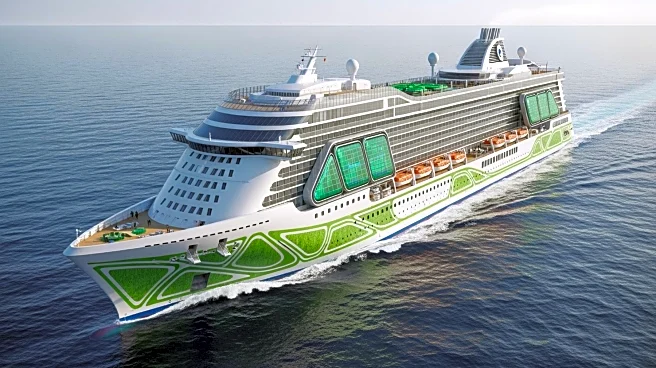What's Happening?
Ponant Explorations Group, in collaboration with GTT and Bloom Energy, is advancing a project to develop the first net-zero cruise ship. The initiative, known as the Swap2Zero Project, aims to achieve carbon neutrality by integrating fuel cells and marine
carbon capture technology. The vessel, designed by LMG Marin and Stirling Design, will feature an 181-meter cruise ship with approximately 100 passenger cabins, utilizing 50 percent wind energy. The ship is projected to operate at a speed of 10 knots with total autonomy for up to 30 days, reducing greenhouse gas emissions by over 80 percent. The project has received a €40 million grant from the EU to support its development, with the goal of having the vessel in service by 2030.
Why It's Important?
This project represents a significant step towards decarbonizing the maritime industry, which is a major contributor to global emissions. By integrating innovative technologies such as solid oxide fuel cells and carbon capture systems, the Swap2Zero Project could set a precedent for future maritime designs, promoting sustainability and reducing environmental impact. The collaboration between Ponant, GTT, and Bloom Energy highlights the importance of cross-industry partnerships in achieving ambitious environmental goals. The successful implementation of this project could lead to broader adoption of similar technologies across the maritime sector, potentially transforming industry standards and practices.
What's Next?
Ponant aims to have the net-zero cruise ship operational by 2030, with ongoing development and testing of the integrated energy system. The project will continue to explore additional designs and technologies to further reduce emissions and enhance energy efficiency. Stakeholders in the maritime industry, including regulatory bodies and environmental groups, are likely to monitor the project's progress closely, as its success could influence future regulations and industry practices. The collaboration may also inspire other companies to invest in sustainable maritime technologies, accelerating the transition to cleaner shipping solutions.
Beyond the Headlines
The Swap2Zero Project not only addresses environmental concerns but also raises questions about the economic viability and scalability of such technologies in the maritime industry. The integration of advanced energy systems could lead to increased operational costs, which may affect ticket prices and accessibility for consumers. Additionally, the project underscores the ethical responsibility of industries to innovate towards sustainability, balancing economic interests with environmental stewardship. As the maritime sector evolves, it will be crucial to consider the long-term implications of these technologies on global trade and transportation networks.














